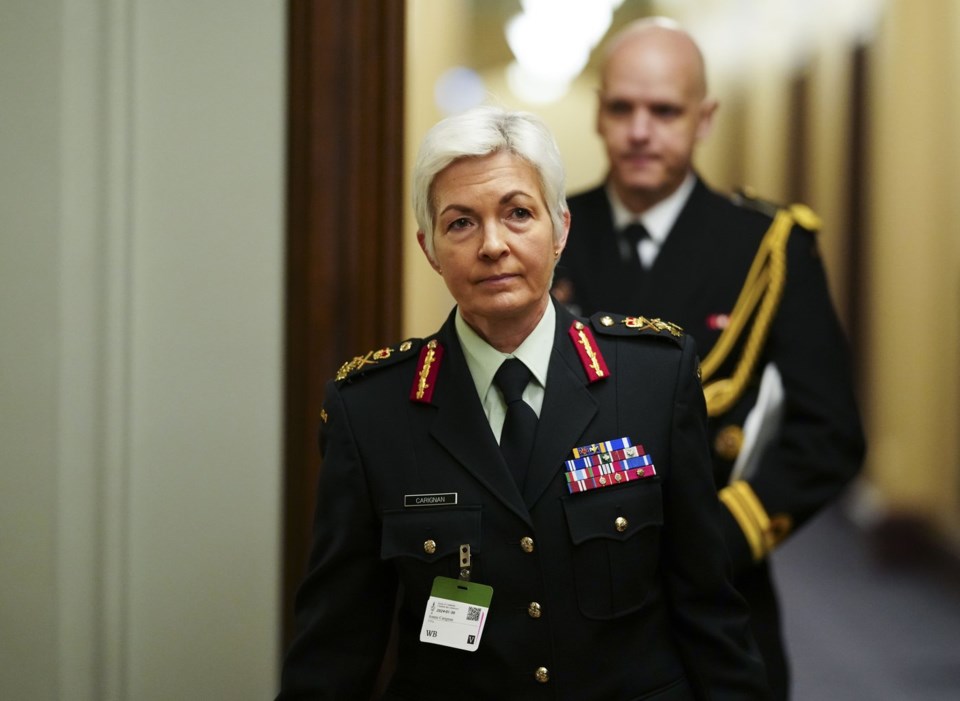OTTAWA — A woman will finally hold the Canadian military's top job, after the federal government named Lt.-Gen. Jennie Carignan as the new defence chief on Wednesday.
Carignan is currently the military's chief of professional conduct and culture, a position created following the sexual misconduct crisis.
Several high-ranking leaders were forced to step down from their posts after they were accused of sexual misconduct in 2021.
The resulting scandal prompted a damning external report by former Supreme Court justice Louise Arbour that made a series of recommendations to change the toxic culture within the Armed Forces. Carignan has been the face of the efforts to reform that culture, providing updates to the public about efforts to implement those recommendations.
Carignan joined the military in 1986, and has commanded combat engineer regiments and led troops responding to floods in Quebec.
In 2008, she became the first woman to lead a combat force in the Canadian military.
She received the Meritorious Service Medal and the Governor General's Order of Military Merit, and her deployments included Afghanistan, Bosnia and Syria. She led a yearlong NATO mission in Iraq that ended in late 2020.
Her official biography also notes that she has four children, including two who are members of the Armed Forces.
Charlotte Duval-Lantoine, a fellow with the Canadian Global Affairs Institute, said the appointment is "fantastic news," noting Carignan is taking over command 35 years after women were first allowed to serve in combat roles in the Armed Forces.
She also warned that there may be pushback or resistance, particularly because the appointment comes from the Liberal government.
"A lot of people have seen and perceived the Trudeau government efforts toward inclusivity and gender parity as performative," Duval-Lantoine said.
Prime Minister Justin Trudeau told reporters in Montreal on Wednesday that naming the new defence chief was an "extraordinarily important choice."
"Particularly in these moments of complicated geopolitics and increased threats, particularly to our Arctic," he said.
"Making sure that we have the right person to lead our Armed Forces in this pivotal time was something that I think Canadians appropriately felt that we needed to take seriously, which we did."
Carignan takes over a military in transition, amid the ongoing culture change efforts and the urgent task of trying to rebuild its ranks after years of declining recruitment and poor retention.
The Armed Forces is short of around 16,000 troops, and for several years it has failed to recruit more members than it has lost to retirement or release, something that Defence Minister Bill Blair called a "death spiral" back in March.
That has been a source of tension between the government and military leadership, because it comes at the same time as increased demands on the Armed Forces to respond to weather-related emergencies in Canada and boost the country's presence in eastern Europe as war rages in Ukraine.
Maya Eichler, a professor of political and women's studies at Mount Saint Vincent University in Halifax, said recruitment, training and retention of troops has to be the top priority — and argued that goes hand-in-hand with making the military's culture more inclusive.
"Lt.-Gen. Carignan certainly has gained a lot of insight into culture change and reconstitution. But in the current security context, it will be a challenge for any (defence chief) to keep culture change on the list of priorities, even if it is absolutely necessary in order to address recruitment and retention issues," she said.
In a recent interview, the outgoing defence chief said the military is "starting to sense a turnaround" in recruitment.
Gen. Wayne Eyre said Canada's allies are facing similar challenges in recruiting for their militaries, and the problem is not fully understood.
He cited the "very tight labour market" as one challenge, along with changing demographics.
Eyre said there are also issues with Canadians' readiness to serve, with "increased incidence of medical challenges, mental-health challenges."
The Armed Forces is experimenting with changes to its medical admissibility for people with certain conditions like allergies, or those who are taking medication for ADHD.
"We have started a pathway for significant change across the institution," he said, adding that an upcoming internal strategy will detail efforts to improve the military's overall readiness.
Eyre was appointed in 2021 when Adm. Art McDonald stepped down weeks into his tenure as defence chief after being accused of sexual misconduct.
He said stabilizing the organization amid that scandal was the top priority.
"It's a work in progress, and so that's what I leave for my successor: unfinished work, but work that will never be finished because it continues to evolve," he said.
Carignan is set to officially take over command of the Armed Forces in a ceremony on July 18.
Lt.-Gen. Frances Allen, who was the first woman to be named vice-chief of the defence staff, also plans to retire this year and will be replaced in an early August change-of-command ceremony. Her successor has not been named publicly.
This report from The Canadian Press was first published July 3, 2024.
Sarah Ritchie, The Canadian Press

